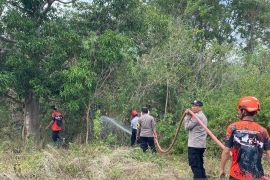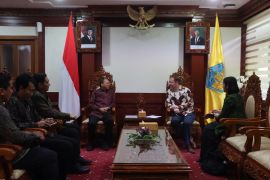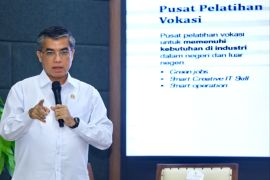Most occupational accidents in Indonesia did not happen at workplaces but on the roads when the workers are heading to or returning from work.Jakarta (ANTARA News) - The number of deaths in occupational accidents in Indonesia is high because most of them occur on roads filled with motorists who flout the traffic rules.
Accidents that befall workers heading to or returning from their workplaces are legally categorized as occupational accidents. Director General of Manpower Supervision Development of the Ministry of Manpower, Muji Handaya, said most occupational accidents in Indonesia did not happen at workplaces but on the roads when the workers are heading to or returning from work.
"Sixty percent of occupational accidents were traffic accidents while the remaining 40 percent happened at workplaces," the director general told a two-day Asia-Europe Meeting (ASEM) workshop on National Occupational Safety and Health (OSH) held in Semarang on Wednesday and Thursday.
The rate of occupational accidents in Indonesia is high compared with those in other Asian countries and Europe. "In 2010, the number of occupational accidents in Indonesia was recorded at 98,000.
Some 1,200 of the total were fatal, the director general said on Thursday. This meant that an average of seven workers die due to occupational accidents every day in Indonesia.
If compared with the rates of occupational accidents in Denmark and Germany, the number of occupational accidents in Indonesia was smaller as in the two other countries occupational accidents totaled 100,000 in 2010, yet the number of workers who died was smaller, namely about 500.
According to Secretary General of Manpower and Transmigration Partnership, Besar Setyoko, in the first semester of 2010, Indonesia recorded a total of 53,000 occupational accidents.
"About 60-70 percent of the accidents were traffic accidents, which took place when workers were heading to or returning home from their workplaces," Besar Setyoko recently.
He said that the remaining ones were accidents in the workplaces. Some died of diseases they suffered as a result of work.
Besar said that the high rate of occupational traffic accidents was due to the fact that the traffic was heavy or the traffic users were not disciplined.
The Ministry of Manpower and Transmigration continued to do its best to reduce the number of occupational accidents, he said.
He said that the number of occupational accidents in 2009 was 96,513, hoping that this year it would be reduced to be lower than that, particularly accidents that caused death.
"Therefore, our main target is to reduce accident cases that can cause death," Muji Handaya said.
He said that every company must meet all health and safety work (K3) requirements because meeting these requirements would not only be useful for improving workers prosperity but also become part of the company`s need.
"Fulfilling the K3 requirement will support the company`s business activities such as improving productivity and the acceptance of the company`s products by the market," he said.
Therefore, Indonesia is proposing that standards that should be reached in the implementation of the health and safety work requirement should be raised.
The standards should be set not only Asian countries but also in Europe in an effort to give workers better protection against occupational accidents.
"The awareness and cooperation of all sides to support the implementation of the occupational health and safety is needed to attract investment and increase economic development in Asian and European countries," Manpower Minister Muhaimin Iskandar said in written statement the Asem meeting.
The minister made the proposal when he opened the Asia-Europe Meeting (ASEM) workshop on National Occupational Safety and Health (OSH) strategies held in Yogyakarta on Wednesday and Thursday.
Representatives of the International Labor Organization (ILO), ASEAN Secretariat and European Commission also attended the meeting, besides delegates from 24 Asian and European countries.
Muhaimin said that in the globalized era, particularly in the face of international trade, the implementation of occupational health and safety standards was a prerequisite which had big impacts on the investment values, quality and quantity of products, companies` sustainability and the competitive edge of a country.
The minister in its efforts to promote the health and safety work standards would award regional governments who are successful in minimizing occupational accidents. Last May for example, at least 11 governors and 20 mayors/district heads were awarded for their success in promoting occupational safety and health (K3) programs at national and district levels.
"The awards are a form of the government`s appreciation for their endeavors in familiarizing the public with occupational safety and health programs at national level. Hopefully, the awards will motivate regional governments, companies and the public to promote the programs in pursuit of an occupational safety and health-minded Indonesia in 2015," the minister said.
The minister also presented 750 awards consisting of zero accident awards to 512 companies and occupational health and safety management system awards to 238 companies from all over the country.
He said the implementation of occupational safety and health programs must become a cross-sectoral activity and therefore, there must be coordinated and integrated steps to ensure that the programs could be carried out well at municipal/district level.
The minister admitted the implementation of the programs was still facing a number of obstacles including low awareness and discipline among employees, employers and the community, and a lack of supervisory officers.
"To improve the awareness and discipline among workers, all managers of companies and heads of labor unions are expected to implement occupational safety and health programs at their respective companies/workplaces under the spirit of togetherness in pursuit of the companies` progress and workers` welfare," he said.(*)
Reporter: by Andi Abdussalam
Editor: Heru Purwanto
Copyright © ANTARA 2011











